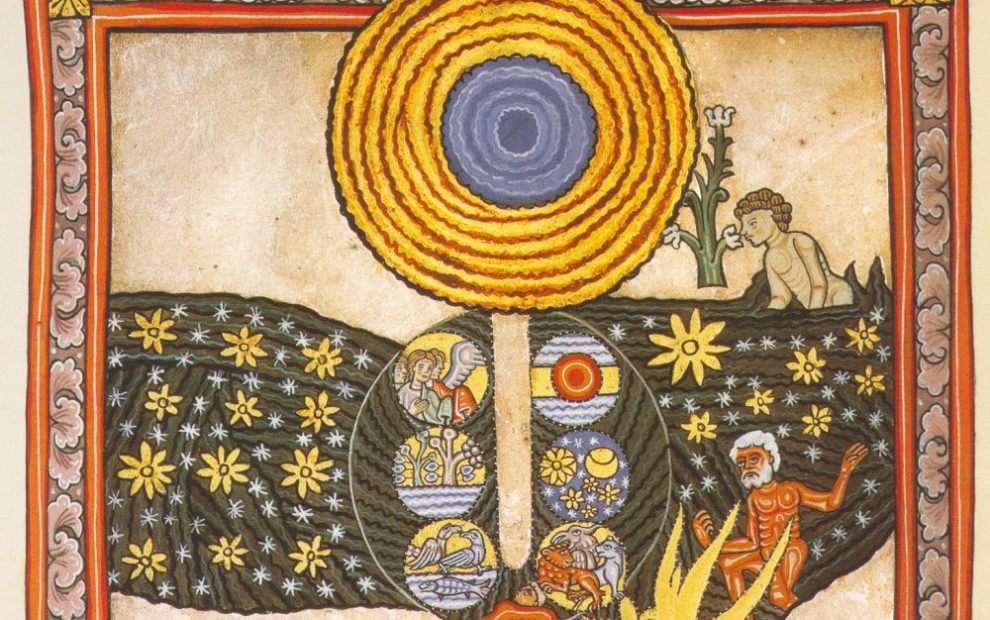The following excerpt is adapted from Our Church Speaks by Ben Lansing and D.J. Marotta. ©2024 by Benjamin Terry Lansing and Daniel John Marotta Sr. Used by permission of InterVarsity Press. www.ivpress.com.
Hildegard of Bingen was a prolific figure, active throughout her long life as an influential church leader, theologian, mystic, visionary, poet, composer, and scientist. She was born the tenth child of a family in Germany, and her parents dedicated their daughter to the church. At age fourteen, she lived in a small room with a religious hermit named Jutta, who was six years her senior. Jutta became a confidant and mentor to Hildegard, and it was with Jutta that Hildegard shared one of her greatest secrets—that since a very young age, Hildegard had been receiving divine visions from heaven.
Hildegard kept this secret very private until, at the age of forty-two, she received a vision in which God unveiled understanding and wisdom about creation and the spiritual life. “The heavens were opened and a blinding light of exceptional brilliance flowed through my entire brain. And so it kindled my whole heart and breast like a flame, not burning but warming” (Joe Staines, The Rough Guide to Classical Music [London: Rough Guides LTD, 2010], 256). The vision instructed Hildegard to begin writing down what God had told her over the course of her life.
Hildegard began writing down all that had been revealed to her over a lifetime of visions. Her writings were extensive and covered a wide range of subjects, including botany, medicine, theology, and music. Her musical compositions are considered one of the origins of Western classical music. Hildegard believed that making music brought one closer to God. “Words symbolize the humanity of the son of God,” Hildegard wrote, “but music symbolizes his divinity” (“The Life and Works of Hildegard von Bingen [1098-1179],” Kenyon College). Hildegard collected her musical compositions into a large compendium, which she called the Symphonic Harmony of Celestial Revelations.
Hildegard is also considered the founder of scientific natural history. Her writings on medicine were widely respected, and many journeyed to seek her healing skills in using plants and herbs. She taught that because all of creation was made by God, all plants and animals had unique purposes and uses for humankind. She believed that scientific study was a critical component of the church’s holistic life.
Hildegard’s reputation for wisdom made her a prominent leader in medieval Germany, and she was called on to resolve disputes among clergy. Today, she is among a short list of historical theologians officially bestowed with the title doctor of the church.
Everyday Majesty
When one of my daughters was barely a year old, she heard rain falling outside. It seemed a strange, unusual sound to her. She crawled to a window, pulled herself up, and peered out at the wondrous mystery: water was falling from the sky. She turned her head toward my wife and gestured toward the window with wide eyes that seemed to say, “Mama, can you believe what is happening out there?” My wife walked over and knelt beside her; cheek to cheek, they stayed for several moments, looking and wondering together.
When I returned home from work that evening and heard from my wife about our daughter’s discovery of rain, it struck both of us as a tremendous gift to see the world through her eyes for a few moments. To us, rain is a boring, inconvenient, almost everyday kind of thing. But as my wife explained to our child, “We need water to live, and it just falls right out of the sky onto us. It’s quite amazing.”
We are surrounded by the glory and majesty of the natural world, but many of us have become so accustomed to it that we no longer notice it. It’s like the year I rented an apartment close to train tracks: the first few weeks, the roar of a passing train was deafening; but after a few months, I could not hear it anymore. Only if someone new visited my place and commented with something like, “How can you stand all that noise?” would I notice that a train was passing.
Hildegard was blessed with vision. She not only had eyes to see the spiritual visions that God gave her, but also eyes to see the natural world for the glorious, majestic wonder that it is. When people encountered Hildegard, they began to see the world through her eyes. Her vision opened other people’s eyes to the majesty of God in the created order.
Do you have eyes to see, or has the majesty of God’s nature become boring to you? Who might help you to see?
Image: Wikimedia Commons/ Six Days of Creation, Hildegard von Bingen















Add comment